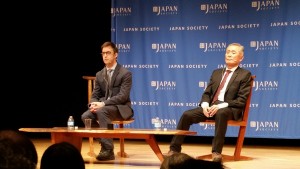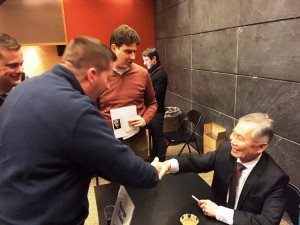JQ Magazine: New York Pledges Allegiance to George Takei at Japan Society

George Takei (right), with moderator Kermit Roosevelt at Japan Society, New York, Jan. 2016. (Ann Chow)
By Lyle Sylvander (Yokohama-shi, 2001-02) for JQ magazine. Lyle has completed a master’s program at the School of International and Public Affairs at Columbia University and has been writing for the JET Alumni Association of New York since 2004. He is also the goalkeeper for FC Japan, a New York City-based soccer team.
On Jan. 25, George Takei participated in a talk at Japan Society in New York. Best known for playing the role of Sulu on the original Star Trek and its movie incarnations, Takei has embarked on a second career as a social rights activist. Takei’s childhood in a pair United States internment camps for people of Japanese descent during World War II provided the focus for the conversation (entitled From Barbed Wire to Broadway), which was moderated by Kermit Roosevelt, a constitutional law scholar at the University of Pennsylvania (and great-great grandson of President Theodore Roosevelt). Takei is also concurrently appearing on Broadway in a musical inspired by his internment experiences called Allegiance (book by Marc Acito, Jay Kuo and Lorenzo Thione; music and lyrics by Jay Kuo). The show, also starring Lea Salonga and Telly Leung, is playing at the Longacre Theatre through February 14.
There is no doubt that Takei’s childhood experiences formalized his worldview and search for justice. He spoke at length of his memories of being forced out of his Los Angeles home at the age of five and relocated to the Rohwer War Relocation Center for Internment in Arkansas, and later, the Tule Lake War Relocation Center in central California. Takei also put his personal experiences within a historical and political context: After the bombing of Pearl Harbor, anti-Japanese paranoia made all U.S. citizens of Japanese heritage suspect. Due process of law was completely suspended as Japanese Americans were forcibly removed from their homes without charge or evidence. Once in the internment camps, the prisoners had to forswear loyalty to the Emperor of Japan and pledge allegiance to the United States.
Takei explained that Earl Warren, then the Attorney General of California, became the driving force behind the internment. While he later expressed regret over his actions (the U.S. Senate voted to make reparations to an estimated 60,000 survivors of the camps in 1988), Warren at the time put aside his misgivings in favor of his political ambitions. He later, of course, became Governor of California and Chief Justice of the U.S. Supreme Court. Takei then drew chilling comparisons to our politicians today and the issues of Islamic extremism and the Syrian refugee crisis. In fact, at every performance of Allegiance, there is a seat reserved for Donald Trump. (So far, Mr. Trump has failed to appear.)
After the talk, Takei graciously answered questions from the audience and signed CDs of the recently released cast album of Allegiance. When introduced to several members of the JET Alumni Association of New York attending the event, Takei spoke with delight about his own nephew’s experiences as an alumnus of the program, and even took the opportunity to banter in Nihongo with one lucky attendee.
For upcoming events at Japan Society, visit www.japansociety.org.
For tickets to Allegiance, visit http://allegiancemusical.com.
Visit George online at www.georgetakei.com.



Comments are closed.